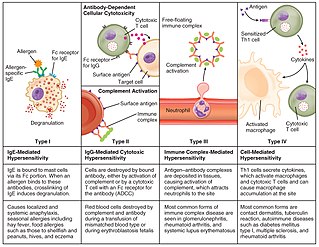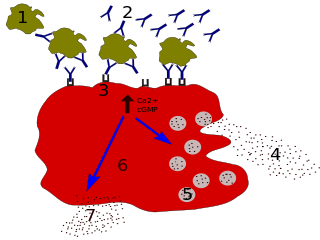Related Research Articles

In immunology, an antigen (Ag) is a molecule, moiety, foreign particulate matter, or an allergen, such as pollen, that can bind to a specific antibody or T-cell receptor. The presence of antigens in the body may trigger an immune response.

The immune system is a network of biological systems that protects an organism from diseases. It detects and responds to a wide variety of pathogens, from viruses to bacteria, as well as cancer cells, parasitic worms, and also objects such as wood splinters, distinguishing them from the organism's own healthy tissue. Many species have two major subsystems of the immune system. The innate immune system provides a preconfigured response to broad groups of situations and stimuli. The adaptive immune system provides a tailored response to each stimulus by learning to recognize molecules it has previously encountered. Both use molecules and cells to perform their functions.

Immunology is a branch of biology and medicine that covers the study of immune systems in all organisms.

In immunology, autoimmunity is the system of immune responses of an organism against its own healthy cells, tissues and other normal body constituents. Any disease resulting from this type of immune response is termed an "autoimmune disease". Prominent examples include celiac disease, diabetes mellitus type 1, Henoch–Schönlein purpura, systemic lupus erythematosus, Sjögren syndrome, eosinophilic granulomatosis with polyangiitis, Hashimoto's thyroiditis, Graves' disease, idiopathic thrombocytopenic purpura, Addison's disease, rheumatoid arthritis, ankylosing spondylitis, polymyositis, dermatomyositis, and multiple sclerosis. Autoimmune diseases are very often treated with steroids.

The T helper cells (Th cells), also known as CD4+ cells or CD4-positive cells, are a type of T cell that play an important role in the adaptive immune system. They aid the activity of other immune cells by releasing cytokines. They are considered essential in B cell antibody class switching, breaking cross-tolerance in dendritic cells, in the activation and growth of cytotoxic T cells, and in maximizing bactericidal activity of phagocytes such as macrophages and neutrophils. CD4+ cells are mature Th cells that express the surface protein CD4. Genetic variation in regulatory elements expressed by CD4+ cells determines susceptibility to a broad class of autoimmune diseases.
In biology, immunity is the state of being insusceptible or resistant to a noxious agent or process, especially a pathogen or infectious disease. Immunity may occur naturally or be produced by prior exposure or immunization.

Hypersensitivity is an abnormal physiological condition in which there is an undesirable and adverse immune response to an antigen. It is an abnormality in the immune system that causes immune diseases including allergies and autoimmunity. It is caused by many types of particles and substances from the external environment or from within the body that are recognized by the immune cells as antigens. The immune reactions are usually referred to as an over-reaction of the immune system and they are often damaging and uncomfortable.

Immunoglobulin E (IgE) is a type of antibody that has been found only in mammals. IgE is synthesised by plasma cells. Monomers of IgE consist of two heavy chains and two light chains, with the ε chain containing four Ig-like constant domains (Cε1–Cε4). IgE is thought to be an important part of the immune response against infection by certain parasitic worms, including Schistosoma mansoni, Trichinella spiralis, and Fasciola hepatica. IgE is also utilized during immune defense against certain protozoan parasites such as Plasmodium falciparum. IgE may have evolved as a defense to protect against venoms.
Haptens are small molecules that elicit an immune response only when attached to a large carrier such as a protein; the carrier may be one that also does not elicit an immune response by itself. The mechanisms of absence of immune response may vary and involve complex immunological interactions, but can include absent or insufficient co-stimulatory signals from antigen-presenting cells.
Polyclonal antibodies (pAbs) are antibodies that are secreted by different B cell lineages within the body. They are a collection of immunoglobulin molecules that react against a specific antigen, each identifying a different epitope.
Immunopathology is a branch of medicine that deals with immune responses associated with disease. It includes the study of the pathology of an organism, organ system, or disease with respect to the immune system, immunity, and immune responses. In biology, it refers to damage caused to an organism by its own immune response, as a result of an infection. It could be due to mismatch between pathogen and host species, and often occurs when an animal pathogen infects a human.
Immunogenicity is the ability of a foreign substance, such as an antigen, to provoke an immune response in the body of a human or other animal. It may be wanted or unwanted:
Immune tolerance, also known as immunological tolerance or immunotolerance, refers to the immune system's state of unresponsiveness to substances or tissues that would otherwise trigger an immune response. It arises from prior exposure to a specific antigen and contrasts the immune system's conventional role in eliminating foreign antigens. Depending on the site of induction, tolerance is categorized as either central tolerance, occurring in the thymus and bone marrow, or peripheral tolerance, taking place in other tissues and lymph nodes. Although the mechanisms establishing central and peripheral tolerance differ, their outcomes are analogous, ensuring immune system modulation.
Immune dysregulation is any proposed or confirmed breakdown or maladaptive change in molecular control of immune system processes. For example, dysregulation is a component in the pathogenesis of autoimmune diseases and some cancers. Immune system dysfunction, as seen in IPEX syndrome leads to immune dysfunction, polyendocrinopathy, enteropathy, X-linked (IPEX). IPEX typically presents during the first few months of life with diabetes mellitus, intractable diarrhea, failure to thrive, eczema, and hemolytic anemia. unrestrained or unregulated immune response.
In immunology, an adjuvant is a substance that increases or modulates the immune response to a vaccine. The word "adjuvant" comes from the Latin word adiuvare, meaning to help or aid. "An immunologic adjuvant is defined as any substance that acts to accelerate, prolong, or enhance antigen-specific immune responses when used in combination with specific vaccine antigens."
Immunology is the study of the immune system during health and disease. Below is a list of immunology-related articles.
Severe cutaneous adverse reactions (SCARs) are a group of potentially lethal adverse drug reactions that involve the skin and mucous membranes of various body openings such as the eyes, ears, and inside the nose, mouth, and lips. In more severe cases, SCARs also involves serious damage to internal organs.
The p-i concept refers to the pharmacological interaction of drugs with immune receptors. It explains a form of drug hypersensitivity, namely T cell stimulation, which can lead to various acute inflammatory manifestations such as exanthems, eosinophilia and systemic symptoms, Stevens–Johnson syndrome, toxic epidermal nercrolysis, and complications upon withdrawing the drug.
Passive antibody therapy, also called serum therapy, is a subtype of passive immunotherapy that administers antibodies to target and kill pathogens or cancer cells. It is designed to draw support from foreign antibodies that are donated from a person, extracted from animals, or made in the laboratory to elicit an immune response instead of relying on the innate immune system to fight disease. It has a long history from the 18th century for treating infectious diseases and is now a common cancer treatment. The mechanism of actions include: antagonistic and agonistic reaction, complement-dependent cytotoxicity (CDC), and antibody-dependent cellular cytotoxicity (ADCC).
Nicotine vaccine is a novel immunological strategy for treating nicotine addiction. Nicotine vaccine uses active immunization as the methodology to create polyclonal antibodies to the antigens, which is then used to treat drug abuse. The immune system is then able to identify nicotine as a foreign substance and initiate an immune reaction targeting the drug. As a result, the quantity of nicotine that enters the brain would decrease after receiving the vaccine. In preclinical studies, nicotine vaccines have demonstrated the ability to combat the negative effects of nicotine abuse, but none of the developed vaccines has been authorized for use in clinical trials as a smoking cessation strategy. Theoretically, the decrease of nicotine's rewarding effects should result in smoking cessation. Some companies have tested candidate vaccines in clinical trials, but evidence failed to show the adequate antibody responses or exhibit superior efficacy to factors concerning placebo.
References
- 1 2 3 4 5 6 7 8 9 10 11 12 13 Rooney, A.A.; Luebke, R.W.; Selgrade, M.K.; Germolec, D.R. (2012). "Immunotoxicology and Its Application in Risk Assessment". In Luch, A. (ed.). Molecular, Clinical and Environmental Toxicology : Volume 3 :Environmental Toxicology. Experientia Supplementum. Vol. 101. Springer, Basel. pp. 251–287. doi:10.1007/978-3-7643-8340-4_9. ISBN 978-3-7643-8340-4. PMID 22945572.
- 1 2 Haschek and Rousseaux's Handbook of Toxicologic Pathology (3 ed.). Elsevier. 2013. pp. 1795–1862.
- 1 2 3 4 5 6 7 Luster, Michael I. (2014). "A historical perspective of immunotoxicology". Journal of Immunotoxicology. 11 (3): 197–202. doi:10.3109/1547691x.2013.837121. ISSN 1547-691X. PMID 24083808.
- 1 2 3 4 5 6 7 Galbiati, Valentina; Mitjans, Montserrat; Corsini, Emanuela (2010-08-24). "Present and future ofin vitroimmunotoxicology in drug development". Journal of Immunotoxicology. 7 (4): 255–267. doi: 10.3109/1547691x.2010.509848 . ISSN 1547-691X. PMID 20735150.
- 1 2 3 4 5 6 7 8 Hartung, Thomas; Corsini, Emanuela (2013). "Food for Thought... Immunotoxicology: challenges in the 21st century and in vitro opportunities". ALTEX. 30 (4): 411–426. doi: 10.14573/altex.2013.4.411 . hdl: 2434/231876 . ISSN 1868-596X. PMID 24173166.
- 1 2 3 Dunsinska, Maria; Tulinska, Jana; El Yamani, Naouale; Kuricova, Miroslava; Liskova, Aurelia; Rollerova, Eva; Rundén-Pran, Elise; Smolkova, Bozena (2017). Rollerova (ed.). "Immunotoxicity, genotoxicity and epigenetic toxicity of nanomaterials: New strategies for toxicity testing?". Food and Chemical Toxicology. 109 (Pt 1): 797–811. doi: 10.1016/j.fct.2017.08.030 . hdl: 11250/2479711 . PMID 28847762.